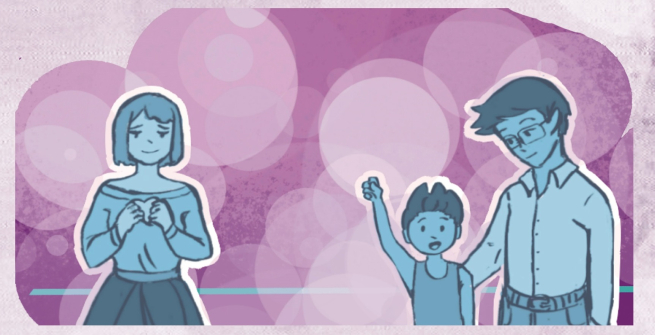During the stay-at-home pandemic order, it became evident that mental health was an increasingly problematic issue. Being sequestered in their homes, teens would also be impacted by events in their domestic sphere. During this time, a worldwide trend became prominent: an upward spike in domestic violence. Time Magazine referred to this trend as the “Pandemic Within the Covid-19 Pandemic”. There was a clear concern about the impact increased domestic violence would have on the communities and families we serve and the teens we work with. This seeded the teen project on domestic violence awareness. The Teens Leading Change Initiative was a perfect match for this. Funded by the Library Foundation of Los Angeles and the Los Angeles Public Library, it is an opportunity for 14 to18-year-olds to develop and participate in a civic action project and implement positive change in their community.
Strength United was a natural collaborator. Through funding from the California Department of Public Health, CSUN community agency: Strength United and the Canoga Park and Encino/Tarzana Public Libraries partnered to support local youth creating change in their community using the Close 2 Home framework. Close 2 Home is a community mobilization framework created to empower youth and adult leaders in raising awareness surrounding sexual and domestic violence in their community. We invite you to check out our Healthy Relationship Pledge located at the back of the book and join us in our commitment to always show respect in any and all relationships. We proudly support the youth and are honored to be a part of their leadership journey.
These organizations worked together to provide four weeks of intensive Domestic Violence Education from Strength United, graphic novel education from Evan Burse of The Cartoon Block, legislative education with representatives from the office of Assemblymember Jesse Gabriel, and podcast and cognitive training from Connectopod.
As they ran meetings and engaged in training, the teens adopted an activist stance referring to themselves as “Teens against Domestic Violence”. Their passion for the project turned into a creative force as the teens developed committees that included Social Media, Legislative Advocacy for Teen Mental Health, Graphic Novel, Writer/Research, Resource Guide, and Zine. Individuals stepped into Committee Lead positions. We watched in awe as they performed their own project management in virtual spaces, creating their own meetings, deadlines, and deliverables. They motivated each other and held each other accountable.
Fifteen teens donated their summer vacation to create this book now available on Overdrive and Biblioboard. They hope it will help people better define the criminal behaviors of domestic violence and guide them out of the entrapments. The teen volunteers’ efforts, activism, and leadership have made the librarians, educators, podcasters, animators, zine makers, and advocates who assisted them along the way, so very proud.
—Co written with YA Librarian, Elisabeth Calla, and with special thanks to Betsy Meiman for the audio support and Karl Casey for the music.

Episode 1: The teens define different types of domestic violence and describe some of the signs of each type. Included is contact information for anyone who would like to reach out for help.
Listen:

Episode 2: The teen reporters interview Esther Niell, Certified Victim Advocate with the City of Los Angeles. Each reporter poses a question that relates to a specific type of domestic violence.
Listen:

Episode 3: Betsy Foldes Meiman of Connectopod asks the teens why they engaged in the Domestic Violence Awareness Project, what end products were created, and how they made the whole thing happen.
Listen:

